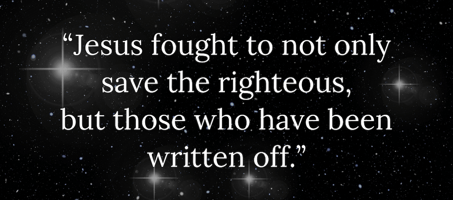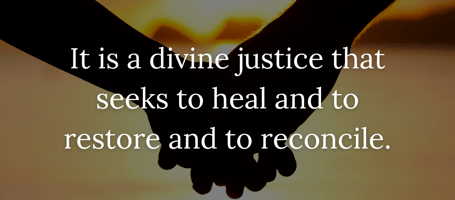This blog is based on a guest sermon given Feb. 18 by Sheila Feay-Shaw. I am not a Biblical...
Blessed Are The Merciful: Stories of Mercy Given and Received
 Have you received mercy?
Have you received mercy?
Years ago, when I was working for the state, one of my responsibilities was setting up payments for workers providing in-home care. One day when I was new on the job, a client called and told me that her worker had not gotten paid. After scrambling to figure out what went wrong, I discovered that I had never entered the payment.
My heart skipped a beat.
What if the worker was dependent on this money? Because of my mistake, it would be another whole week until they would receive their check. The hardest part was calling the client, telling them that I had messed up, and apologizing.
I’ll never forget her response. She said, “Teresa, I know that you work hard for us and that you are still learning. Don't worry about it. They’re not even worried about that check.”
I remember how I felt — the mercy that she had extended to me. This is what mercy looks like.
Mercy begets mercy. The manner of mercy that we show to others is the same mercy that is shown to us.
In his article The Fifth Beatitude: The Most Surprising Act of Grace, Haroldo Camacho asks: “Would we be merciful without the promise that mercy will be shown to us?” When we read in Mathew 5:7 “Blessed are the merciful, for they shall obtain mercy,” is the promise of mercy for ourselves just a carrot, dangled before us to get us to step out of our self-centeredness and show mercy to others?
Sometimes we assume that groups of people are not deserving of God’s grace and mercy. We are like Jonah; God told him to go into Nineveh and spread God’s message to the people there, but Jonah decided to go in the opposite direction because he felt like they did not deserve it.
There are people who might feel like immigrants crossing the border, treated as if they are undeserving of God’s grace. Maybe the rowdy teenagers at the movie theater upset you, or you’re at wits end with the relative who can’t stay out of rehab. But these are the people that we are called upon to extend mercy to. We may feel like, because we pulled ourselves up by our bootstraps, others must do the same. But mercy is the way of God. “Blessed are the merciful, for they shall obtain mercy.”
In his poem “I, Too,” Langston Hughes writes:
I am the darker brother.
They send me to eat in the kitchen
When company comes,
But I laugh,
And eat well,
And grow strong.
Tomorrow,
I’ll be at the table
When company comes.
Nobody’ll dare
Say to me,
“Eat in the kitchen,”
Then.
He’s talking about not being treated like a human being. That's mercy. What does mercy look like when we wear it? How does our heart become merciful?
In his book Desiring God, John Piper says that a merciful person is one who has been spiritually bankrupt. They know what it's like to struggle. They understand that human beings are not perfect.
As adults, as parents, as human beings — we often pretend like we have it all together. But there are days when you want to lash out. That may be because you’re dealing with your own trauma — not the issue at hand. Mercy starts with understanding that. Our mercy comes from God.
The blog Theology of Work has this to say about mercy in the workplace: “At work, mercy has a highly practical effect. We are to aid others to attain their best outcomes, regardless of how we feel about them. When you assist a co-worker, whom you may not like and who may even have wronged you in the past, you are showing mercy.”
The Lord is compassionate, gracious, slow to anger and overflowing with mercy and truth. I like the way the late Abraham Joshua Heschel describes mercy. He says that it’s better to limit belief in God’s power than to dampen faith in God’s mercy. God’s mercy takes precedence even when it feels like we’re seeing so much evil in the world. God’s mercy will triumph over that evil.
Patrick Henry Reardon writes that “When we deal with God, everything is mercy; Everything else that can be said of God is but an aspect of His mercy.”
I want to end with a story of two brothers. A man who owned a store had twin sons who were inseparable. When their father died, the twins took over the family business. One day, one of the brother’s was helping a customer when he realized he had left a dollar bill on the counter. When he went to put the dollar away, it wasn’t there. He confronted his twin, who said he didn’t know what had happened to the dollar. He persisted in asking again and again, day after day. The arguments became worse and worse. Their relationship dissolved; they split the store down the middle and became competitors. This continued for 20 years.
One day a car drove up in front of the building. A man stepped out and approached the brother who had accused the other of theft. He explained that years ago, he had been poor and houseless, and had let temptation get the better of him — he was the one who had taken the dollar bill. Since then, he had found God, and regretted what he had done. He was here to pay back what he had taken. The brother began to cry — 20 years’ worth of bitter tears. He had lost the closest person to him. He told the man to go next door and let his brother know what had happened. The two brothers wept together and reunited.
In Matthew 18: 21–35, Peter asks Jesus, “Lord, how many times shall I forgive my brother when he sins against me? Up to seven times?” To this, Jesus replies, “I tell you, not seven times, but seventy times seven.” The mercy that Jesus teaches is the same mercy that we will receive. Blessed are the merciful, for they will be shown mercy. We will show mercy not one time, but over and over again.
The mercy that we extend to other people is the same mercy that God will extend to us.




